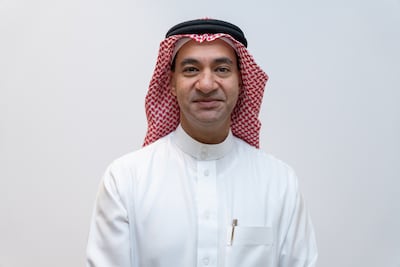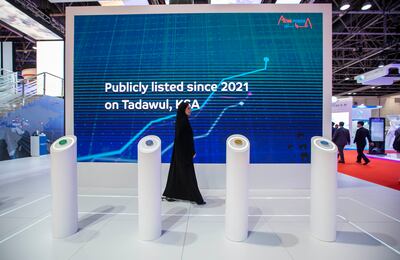Saudi Arabia's private utility developer Acwa Power plans to double down on efforts to expand in China, the world’s largest producer of renewable energy, according to a top executive.
Acwa Power, which opened an office in the Asian country in 2008, will look into developing clean energy projects, with more focus on green hydrogen and desalination projects, said Raad Al Saady, the company’s vice chairman and managing director.
“One of the geographies that will … move the needle for us the most is China,” Mr Al Saady told The National on the sidelines of the Future Investment Initiative.
“We have been doing business in China for many years … we've had business, in terms of acquiring products and services [worth] more than $30 billion already.
“What we've started to do is see how we can take the business that we've created in many parts of the world and take that to China.”

Last month, Acwa Power signed initial agreements with two Chinese companies to bolster collaboration in areas such as green hydrogen and ammonia as well as renewable energy.
The agreements were signed with state-owned China Southern Power Grid International Company and clean energy company MingYang Smart Energy Group.
The International Energy Agency expects China’s energy demand to peak around the middle of this decade amid continued growth in clean energy.
China’s renewable power capacity additions reached 109 gigawatts in the first half of 2023, accounting for 71 per cent of the total new capacity installed in 2022, according to Fitch Ratings.
“We wanted to get ready, and I think the market is also ripe,” Mr Al Saady said.
Acwa Power’s $8.5 billion green hydrogen project in Saudi Arabia’s smart city Neom has motivated the company to explore similar ventures in other geographies, he said.
The Neom project will use 4 gigawatts of renewable power from solar, wind and storage to produce 650 tonnes a day of hydrogen from electrolysis.
The project, expected to come on stream in 2025, will produce about 1.2 million tonnes of green ammonia a year.
Last year, supply chain disruptions resulting from the Covid‑19 pandemic and Russia's invasion of Ukraine drastically increased the cost of raw materials, affecting several sectors including renewable energy.
“The solution to a lot of this, we learnt, [is] that you need to increase your local content, whether it's a requirement or not, it's the right thing for business,” Mr Al Saady said.
The Acwa Power executive said the company has been encouraging its partners to set up manufacturing units in Saudi Arabia.
“We just need to make sure that whoever is doing a project is the best at doing [it]. There are projects in place today,” he added.
Acwa Power, which is aiming to achieve net zero as a company by 2050, is “optimistic” about the future, despite recent economic and geopolitical challenges, Mr Al Saady said.
“2023 has been a very good year for us. Part of it is the work we've done, but a lot of it also is the readiness for the globe for energy transition and we see that trend increasing,” he added.
“The momentum is there and we just have to continue to be ready.”
Renewable energy is expected to make up nearly half of the global electricity mix by 2030 under current policies, but “stronger” measures would be required to meet the goals of the Paris Agreement, the International Energy Agency said in its latest World Energy Outlook.
By the end of the decade, there will be 10 times as many electric cars on the road worldwide, with the share of renewable energy in power generation rising to 50 per cent from 20 per cent now, the agency said.


